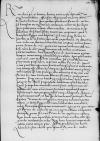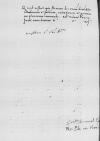List #2436
Samuel MACIEJOWSKI do Ioannes DANTISCUSVilnius, 1541-06-03
| odebrano Heilsberg (Lidzbark Warmiński), 1541-06-11 Rękopiśmienne podstawy źródłowe:
| ||||
Tekst + aparat krytyczny + komentarzZwykły tekstTekst + komentarzTekst + aparat krytyczny
Reverendissimo in Christo Patri et Domino, domino
Reverendissime in Christo Pater et Domine, domine amice et frater observatissime atque honoratissime.
Officiosam obsequiorum meorum commendationem.
De contributione spem quidem ostenderat Reverendissima Dominatio Vestra, sed diversum res exitum est consecuta. Cuius rei facile perspicio, penes quem culpam illam residere.
De moneta et appellatione consilium istinc senatorum accepimus, quod
s(acrae) or s(erenissimae)⌈s(acrae)s(acrae) or s(erenissimae)⌉
De donativo non video, cui tantam liberalitatem acceptam rectius feram, quam Reverendissimae Dominationi Vestrae, quem eius unicum auctorem esse scio. Etsi vero de aliis quoque bene merendi nullam occasionem praetermittam, Vestrae tamen Reverendissimae Dominationi potissimum gratam semper memoremque voluntatem praestabo. Quicquid autem eius erit, non modo boni consulam, sed etiam debere me plurimum profitebor in primis Vestrae Reverendissimae Dominationi, tum et aliis, quorum copia mea praesens inopia fuerit sublevata.
Scio tenues esse adhuc hoc tempore facultates meas, pluris mihi tamen est tam prolixa ista voluntas in me, cum Vestrae Reverendissimae Dominationis, tum
Quod restat, opto Reverendissimam Dominationem Vestram diu esse incolumem et felicem.
Cuius favori et gratiae me plurimum commendo.
Dat(ae) or Dat(um)⌈Dat(ae)Dat(ae) or Dat(um)⌉
Eiusdem Dominationis Vestrae Reverendissimae servitor



 BCz, 1597, p. 1260
BCz, 1597, p. 1260